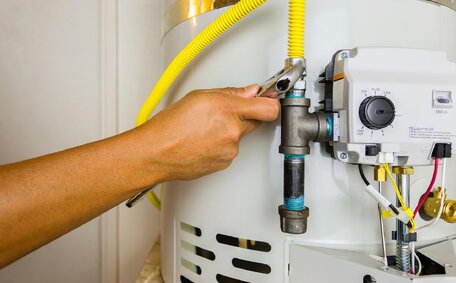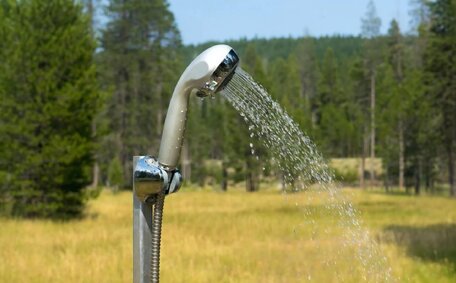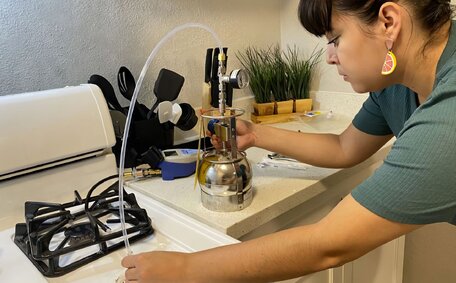Introducing Natural Gas and Propane
When it comes to powering appliances and heating homes in Blakehurst, Sydney, two of the most common fuel choices are natural gas and propane. Though both natural gas and propane are efficient and cost-effective energy options, they have distinct characteristics that set them apart.
Natural gas and propane vary in composition, energy efficiency, environmental impact, safety, and storage, each influencing homeowners’ choice. It’s crucial for homeowners to grasp these distinctions to select the appropriate fuel for their appliances and heating needs.
The key issue for homeowners is determining the superior choice for their home between natural gas and propane.
Chemical Composition and Environmental Effects
When examining the chemical makeup of natural gas and propane, there are some clear differences. Natural gas mainly consists of methane (CH4), accounting for 90-95% of its composition, with the balance being other hydrocarbons such as ethane, propane, and butane.
Propane’s chemical formula C3H8 contains only carbon and hydrogen. So while natural gas contains some propane, propane on its own does not include methane or other natural gas components.
Both natural gas and propane are naturally colourless and odourless gases. For safety reasons, distinctive scents are added to help identify potential leaks - an rotten egg smell for natural gas, and a skunk-like odour for propane.
Looking at environmental impacts, the production and distribution of both fuels lead to some degree of carbon emissions and air pollution. Natural gas, however, produces approximately 30% fewer carbon dioxide emissions than propane when combusted. It also releases less nitrous oxide.
The biggest environmental concern with natural gas is methane leakage, which occurs during drilling, storage and transportation. Methane is 84 times more potent than CO2 in trapping heat, so leaks contribute significantly to global warming and climate change over short time frames.
Natural gas burns more cleanly and has a reduced greenhouse gas effect, although neither fuel is entirely emission-free. But stopping leaks across its supply chain remains critically important.
Infrastructure for Delivery and Installation
When it comes to getting natural gas or propane supplied and hooked up in a home in Blakehurst, Sydney, the required infrastructure differs significantly.
It’s important to note that natural gas is supplied via an underground pipeline network to local homes. Tapping into an existing gas line and installing new in-home lines and appliance fittings is needed, which can only be done by licenced gas plumbers. Homeowners typically pay connection and usage fees to their utility provider.
Propane, on the other hand, is stored on-site in pressurised tanks and replenished periodically by suppliers. Options include large external tanks and small cylinders for items like grills or portable devices. Household propane tanks in Blakehurst require special permits, specific storage conditions, and safety protocols.
Appliance compatibility and conversion is another important consideration when selecting a fuel type. Conversion kits allow many major natural gas appliances, including furnaces, water heaters, and stoves, to use propane. However, propane appliances generally can’t run on natural gas without alterations.
So when determining the best option to fuel your home, factoring in the delivery and storage infrastructure with much higher consideration in Blakehurst is key, along with the potential need for appliance retrofitting if switching fuel sources.
Efficiency and Energy Output
When comparing the energy output and efficiency of natural gas versus propane, an important metric is British Thermal Units (BTUs). BTUs measure the amount energy required to heat or cool one pound of water by one degree Fahrenheit.
Propane gas yields about 2,516 BTUs per cubic foot when combusted, compared to around 1,030 BTUs for natural gas.
This higher BTU content does not automatically make propane the more efficient heating fuel. Fuel efficiency is also influenced by the equipment used. The latest natural gas furnaces can utilise over 95% of the gas BTUs inputted, while even high-efficiency propane furnaces max out at about 93% efficiency.
Propane’s portability and on-site storage does help minimise some forms of heat loss that can occur with natural gas delivery. But methane leakage, even when small, can significantly reduce natural gas system efficiency.
In the end, for the average Sydney household trying to control energy costs, the higher BTU output of propane must be weighed against potential appliance efficiency differences and heat loss considerations.
Before deciding on natural gas or propane, it’s advised to calculate accurate cost comparisons and total BTUs needed to heat your Blakehurst home.
Cost Comparisons
Considering cost alone, several variables emerge when comparing natural gas and propane.
On a per unit basis, natural gas is generally cheaper, with In Sydney, residential prices vary from about 2-5 cents per cubic metre. When priced per BTU, compressed natural gas can be nearly twice as costly, affecting calculations of cubic metres.
However, given propane’s higher efficiency in many heating systems, it can ultimately be less expensive than alternative fuels for households depending on usage. The fact that propane delivers more BTUs per cubic foot means less fuel is required compared to natural gas for equivalent warmth.
Upfront costs also impact affordability. Propane tanks and appliances tend to require higher initial installation investment. Accessing natural gas lines can incur connection fees but eliminates on-site storage expenses down the track.
Maintenance is cheaper for natural gas systems too. But propane tanks remain usable for 20+ years with basic upkeep factored in.
So for the average Sydney household, natural gas offers cheaper per unit and connection costs. But propane can pay itself off over decades assuming appliances efficiently utilise its BTU output, factoring in cubic meters. Either way, factoring in all expenses is advised.
Safety Protocols
When it comes to safely handling natural gas or propane in the home, adhering to strict safety measures is critical.
For both fuel sources, Annual assessments by licensed technicians are essential to identify leaks and confirm that appliances and lines comply with codes. Any detected leaks can be quite hazardous and should be addressed immediately as gas can accumulate unnoticed and explode if ignited.
Good ventilation is critical to prevent the accumulation of gases indoors. Rooms with fuel-burning appliances must have exterior vents, and the areas around air intakes and outlets should be unobstructed. Using rigid, approved piping is also essential to minimise leaks.
Carbon monoxide detectors are vital, as they alert to dangerous levels resulting from incorrect combustion. Annual detector checks and replacements are recommended. Additionally, excess flow valves on propane tanks and earthquake valves on natural gas lines automatically cut off flow during emergencies.
Appliances should be turned off during propane tank refilling to remove ignition risks. And for both fuel types, storage areas should be clearly marked, securing tanks and restricting access. Carefully following manufacturer guidelines for use and maintenance is also critical.
While both propane and natural gas carry risks if mishandled, adhering to codes and best practises substantially improves home safety. Employing reputable, licensed technicians for setup and maintenance minimises risk.
Maintenance Best Practices
To keep natural gas and propane systems running safely and efficiently in homes across Blakehurst, Adhering to stringent maintenance procedures is essential.
For both fuel types, an annual inspection by a qualified technician should be scheduled. Specialists such as Blakehurst Plumbing review all equipment, piping, and tanks for leaks, blockages, and other concerns. They also confirm proper ventilation specs are met in each room.
Technicians will monitor flame quality in appliances and use combustion analysers to test for carbon monoxide. They can also recalibrate pilot lights as needed to optimise efficiency.
Inspectors specially review propane systems to ensure tank integrity, check pressure relief valves, and verify correct filler pipe setup. Replacing outdated or damaged tanks may be recommended.
Routine leak checks are also advised even between annual visits, using soapy water to identify bubbles along the lines. Immediately addressing any leaks or appliance irregularities is critical.
Preventative maintenance decreases costly and dangerous incidents involving both natural gas and propane. Equally, sustained peak efficiency can translate into significant long-term energy bill savings for households.
Choosing the Right Home Heating Fuel
When deciding between natural gas or propane as your home heating fuel in the Blakehurst area, there are a few key factors to weigh up.
Check availability in your region. Natural gas must be supplied via underground pipelines, so propane’s portability may suit rural properties lacking infrastructure access. Additionally, factor in upfront appliance and installation costs, as converting between fuels can require pricey modifications.
Examine efficiency projections to estimate the potential operating expenses. Get quotes outlining total BTUs used annually and calculate expenses based on local energy rates. Though natural gas appears cheaper per unit, propane furnaces can ultimately save households money over decades thanks to reduced heat loss.
Also, assess your personal environmental footprint preferences, as leakage and combustion emissions differentiate the two. If minimising your carbon footprint is a priority, consider sustainable energy alternatives.
Evaluate convenience and maintenance requirements before deciding which fuel best matches your lifestyle needs.
For further assistance tailoring home heating solutions in the Blakehurst area, contact our team at Blakehurst Plumbing. Our qualified technicians can provide quotes and expert advice guiding your transition to reliable, cost-effective natural gas or propane systems.






